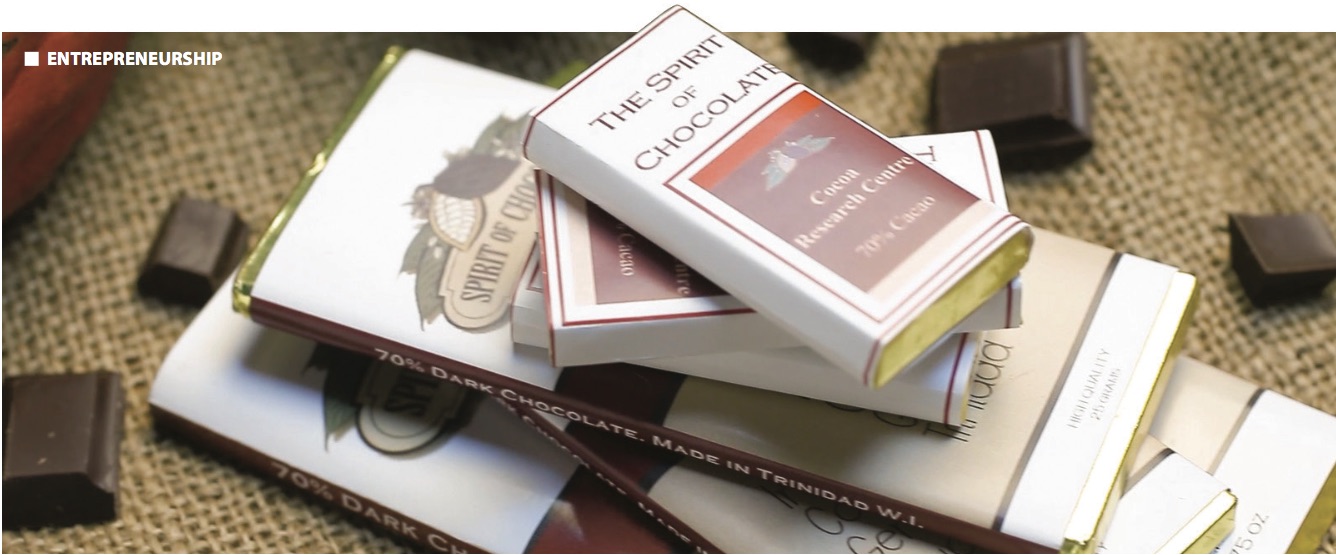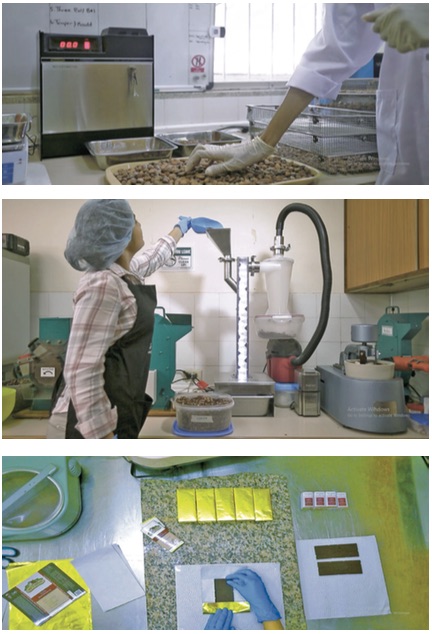
Cocoa Research Centre is guiding an industry from farm to factory to foreign-exchange earning delights
Several decades after the decline of cocoa farming in Trinidad and Tobago, the world is once more becoming aware of T&T's superior brand of cocoa. This movement is championed by the UWI Cocoa Research Centre (CRC).
“Trinidad is like a phoenix rising from the ashes. We are now trying to establish a sort of dynamic equilibrium where we can achieve sustainable economy,” explains Dr Darin Sukha, Research Fellow and Food Technologist, CRC. The Centre’s staff is exploring the potential of cocoa to diversify the local economy and economies across the region.
Farmers are the foundation of the cocoa value chain. Professor Pathmanathan Umaharan, Director of the CRC, explains that the country’s trees are old and farming practices are outdated, but there are farmers willing to learn and to invest. The CRC’s model cocoa orchard serves as a teaching tool for new methods.
“The overall objective is really to build a niche, high-value industry for Trinidad and Tobago so that farmers get better value for the cocoa they produce,” he states. The CRC also provides support to chocolate makers and entrepreneurs. “We want to leverage [the] private sector to be able to invest and develop new products which they can market locally, regionally and internationally,” says Prof Umaharan.

The CRC has trained over 275 people locally through chocolate courses. Graduates of these courses have gone on to open their own chocolate-based businesses. In addition, the Centre has extended essential support to several countries in the region whose cocoa quality and production systems are lagging. Prof Umaharan notes that their value-added industry is very small, and growth would afford them opportunities to build markets.
Establishing a connection between farmers and entrepreneurs is vital. According to Dr Sukha, “We want to bring together all of the key elements of the value chain, so we can use it to show the connectivity, demonstrate how we can all work together, and how they all feed into each other, and how we can use this as a tool for training.”
The inception of the International Fine Cocoa Innovation Centre (IFCIC) will be instrumental in realising this vision. A chocolate factory is in the works which will provide three scales of chocolate-making facilities. It will produce cocoa nibs, cocoa liquor, cocoa butter, chocolate and coverture. It will also be a space for creating awareness about cocoa and its delightful link to chocolate through cocoa and chocolate-based cuisine and chocolate products. The facilities should draw visitors and tourists to indulge in the menu and purchase specialties chocolate lovers dream about like the CRC’s Chocolate Rum Crème, which is made of cocoa from the International Cocoa Genebank Trinidad that is curated by the CRC. The projects are meant to be run as a public/private sector collaboration.
The work of the CRC in value addition also opens the doorway to Trinidad and Tobago leaving a larger mark in the world cocoa industry.
“We haven’t really developed the reputation for the products that are derived from the cocoa beans like chocolates and beverages,” says Prof Umaharan. “The cocoa beans that we sell only take up about six percent of the entire value chain, so if you produce value added products, you can harness the greater part of the cocoa value chain.”
Investment and support are essential to ensure that the commercialisation of local cocoa can flourish. The Government of Trinidad and Tobago (GoRTT) has been a constant ally in this regard. Having already purchased equipment for a chocolate factory from a European Union funded project, the Centre is in active dialogue with GoRTT for funding to complete the factory building. This could mean considerable growth in the manufacture of chocolate products which would have global appeal.
As Damian Wilson, Secretary/Project Assistant at CRC notes, “Our efforts are about expanding to markets regionally and internationally.” This, of course, would bring in much needed foreign exchange. All these efforts dovetail nicely with the current economic diversification thrust and economic recovery roadmap.
Private sector investment is also indispensable. Dr Sukha observes, “The UWI is transitioning from a pure teaching and research institution to one where we are trying to be more applied in our research. We are trying to seek partnerships through a sort of triple helix model involving the university/government/private sector.”
He adds, “We are forging ahead along with The University of the West Indies in realising that vision. We are engaging industry. We are engaging government and bringing everybody together where The UWI is providing the technical back-stopping and support.” All this, he notes, will help the Centre generate some of its own revenue to become more self-sufficient.
Though it can never go back to the old days of the industry, the Trinidad and Tobago cocoa brand has the potential to re-emerge as one of most sought-after treasures in the global quest for exceptional cocoa and cocoa products for exclusive markets.